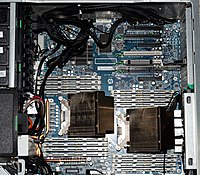Non-Uniform Memory Access

Imagine you have a big toy box, and you want to play with all of your toys. Non-uniform memory access is like you putting your favorite toy in the top of your toy box, and your second favorite toy at the bottom. When you want to play with your favorite toy, you can quickly reach in and grab it. But when you want to play with your second favorite toy, you have to dig through all the other toys to find it.
This is kind of like how non-uniform memory access works in a computer. A computer has a lot of memory (like your toy box) where it stores all the information it needs to do its job. But not all of that memory is the same. Some parts are faster than others and can be accessed more quickly. This is like your favorite toy that's easy to grab. Other parts of memory are slower and take longer to access, like your second favorite toy that you have to dig for.
In a computer, this can make things slower since it takes longer to access some parts of memory. To make things faster, the computer tries to keep the most important and frequently used information in the faster parts of memory. This is like keeping your favorite toy at the top of the toy box where you can easily find it.
So, that's non-uniform memory access. It's when a computer has different kinds of memory with different speeds, and it tries to use the faster memory for the most important tasks to make things run faster.
This is kind of like how non-uniform memory access works in a computer. A computer has a lot of memory (like your toy box) where it stores all the information it needs to do its job. But not all of that memory is the same. Some parts are faster than others and can be accessed more quickly. This is like your favorite toy that's easy to grab. Other parts of memory are slower and take longer to access, like your second favorite toy that you have to dig for.
In a computer, this can make things slower since it takes longer to access some parts of memory. To make things faster, the computer tries to keep the most important and frequently used information in the faster parts of memory. This is like keeping your favorite toy at the top of the toy box where you can easily find it.
So, that's non-uniform memory access. It's when a computer has different kinds of memory with different speeds, and it tries to use the faster memory for the most important tasks to make things run faster.
Related topics others have asked about:
